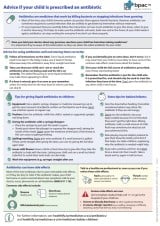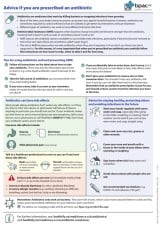You can now add Healthify as a preferred source on Google. Click here to see us when you search Google.
Rifinah
Key points about Rifinah
- Rifinah® is used to treat tuberculosis (TB).
- It's a combination of 2 medicines, rifampicin and isoniazid, in a single tablet.
- Find out how to take Rifinah safely and possible side effects.

Rifinah is used to treat tuberculosis (TB). TB is an infection that mostly affects the lungs, but it can affect any part of your body. TB is treated by taking a combination of antibiotics for at least 6 months. Rifinah is a combination of 2 antibiotics, rifampicin + isoniazid, in a single tablet. Read more about TB.
In Aotearoa New Zealand Rifinah tablets are available in 2 strengths.
-
- Rifinah 150/100mg tablets
- Rifinah 300/150mg tablets
- Always take Rifinah exactly as your doctor has told you. The pharmacy label on your medicine will tell you how much to take, how often to take it and any special instructions.
- The dose of Rifinah is different for different people, depending on your body weight.
- Timing of your dose: Take your Rifinah tablets once a day on an empty stomach at least 30 minutes before, or 2 hours after, food. Swallow the tablets whole with a glass of water. Don't take indigestion remedies, iron or calcium preparations within 2 hours of taking this medicine.
- Missed dose: If you forget to take your dose, take it as soon as you remember. But if it is nearly time for your next dose, take the next dose at the right time. Don't take extra doses to make up for a forgotten dose. If you often forget to take Rifinah, your tuberculosis may not be fully treated.
- Finish the course: You will be asked to take Rifinah every day. Continue to take the tablets every day unless your doctor tells you to stop. This is because it's important for you to finish the course so that the infection doesn't come back. If you stop taking the tablets (such as if you think you may be developing side-effects – see also below) then you must let your doctor know about it straightaway so that you can be given different treatment for your TB.
Here are some things to know when you're taking Rifinah. Other things may be important as well, so ask your healthcare provider what you should know about.
- This medicine may colour your teeth, urine, saliva and other body secretions a yellow, orange, red, or brown colour. This is harmless.
- If you wear soft contact lenses, Rifinah can cause your lenses to become discoloured or stained. Talk to your your doctor or optician about this. A different type of contact lens may be more suitable for you, or you may choose to wear glasses while you're being treated.
- Some foods and drinks may interact with Rifinah. Try to avoid eating foods containing histamine or tyramine (eg, cheese, fermented foods and sauces, soy sauce, yeast extract, some fish such as tuna, and red wine). Taking Rifinah with these foods may cause you to have a fast heart beat, palpitations, flushing, throbbing headache, dizziness, or sweating.
- Rifinah can interact with some medicines, herbal supplements and rongoā Māori, so check with your doctor or pharmacist before starting Rifinah and before starting any new products.
- If you're taking birth control pills, extra care is needed as Rifinah may affect how they work. Talk to your doctor about suitable contraception. You may need to use additional birth control methods while taking Rifinah, and for 4 weeks after stopping.
- Limit alcohol while you are taking Rifinah. Alcohol can increase your chance of side effects, eg, problems with your liver.
- Tell your doctor if you are pregnant, planning to become pregnant, or breastfeeding.
- Tell your doctor if you have diabetes, epilepsy, HIV, or problems with your kidneys or liver.
Like all medicines, Rifinah can cause side effects, although not everyone gets them. If you're concerned about any symptoms you think might be related to your medicine, talk to your healthcare provider. The following information offers some guidance but doesn't include all possible side effects.
Common side effects
Tell your healthcare provider if these side effects bother you.
- Nausea (feeling sick), sore tummy or diarrhoea (runny poo).
- Fast heartbeat, palpitations, flushing, throbbing headache, dizziness, or sweating: These can occur if you are taking Rifinah with foods or drinks containing histamine or tyramine such as cheese, fermented foods and sauces, soy sauce, yeast extract, some fish (eg, tuna) and red wine. Avoid these foods.
Tell your healthcare provider immediately or phone Healthline free on 0800 611 116 if these occur
- Numbness or tingling feelings in your fingers and toes.
- Muscle weakness or ache.
- Feeling dizzy or having slurred speech.
- Skin rash or itching.
- Coughing or problems breathing.
- Signs of problems with your liver such as severe tummy pain, yellowing of the eyes and skin, dark urine.
- Signs of problems with your blood cells such as easy or unusual bruising or bleeding.
- Red or purple spots on your skin that show up for no reason.
Phone 111 for an ambulance or go to your nearest accident and emergency (A&E) clinic if these occur
- Signs of an allergic reaction such as itchy skin, and rash, swollen lips or tongue, problems breathing, like a tight chest or shortness of breath.
Read more about medicines and side effects and reporting a reaction you think might be a side effect.
The following link has more information about Rifinah:
Isoniazid and rifampicin(external link) New Zealand Formulary Patient Information
Brochures
Advice if you are prescribed an antibiotic(external link) BPAC, NZ, 2024
Advice if your child is prescribed an antibiotic(external link) BPAC, NZ, 2024
Medicines and side effects(external link) Healthify He Puna Waiora, NZ, 2024
References
- Rifampicin + isoniazid(external link) New Zealand Formulary
Brochures

Advice if your child is prescribed an antibiotic
BPAC, NZ, 2024

Medicines and side effects
Healthify He Puna Waiora, NZ, 2024
Credits: Sandra Ponen, Pharmacist, Healthify He Puna Waiora. Healthify is brought to you by Health Navigator Charitable Trust.
Reviewed by: Angela Lambie, Pharmacist, Auckland
Last reviewed:






